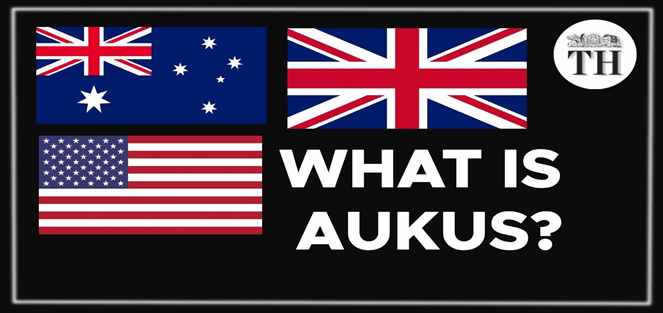International Relations
In News: China withdrew a draft resolution against the AUKUS alliance at the general conference of the International Atomic Energy Agency (IAEA) in Vienna due to lack of majority support.
- The resolution argued AUKUS initiative violated the responsibilities of Australia, the UK and the US under the Nuclear Non-Proliferation Treaty (NPT).
- India’s deft diplomacy to ensure that the draft resolution did not get majority support, was deeply appreciated by IAEA member states and the AUKUS partners.
About AUKUS:
- It is a trilateral security pact between Australia, the United Kingdom, and the United States, announced in 2021 for the Indo-Pacific region.
- To transfer technology to build a fleet of at least eight nuclear-powered submarines armed with conventional weapons.
- The pact is also seen as a deterrence to China’s aggression in the Pacific region.
- The pact also includes cooperation on advanced cyber, artificial intelligence and autonomy, quantum technologies, undersea capabilities, hypersonic and counter-hypersonic, electronic warfare, innovation and information sharing.
- It complements several pre-existing similar arrangements for the region like Five Eyes intelligence cooperation initiative, ASEAN and the Quad.

Significance of AUKUS:
- AUKUS aims to ensure that there will be freedom and openness in the Indo-Pacific region, including the South China Sea.
- Although no explicit mention was made of China in any of the AUKUS announcements, this group challenges the regional hegemonic ambitions of China.
- The operationalisation of this security partnership led to closer coordination among the nations concerned in terms of joint military presence, war games and more in the region.
- Given the inroads that China has made in recent decades with its Belt and Road Initiative in India’s neighbourhood, fears over ‘encirclement’ of India by China may be partially mitigated by AUKUS.
- Further, India may indeed derive secondary benefits from having three advanced nations with arguably the most sophisticated military know-how in the world coming together.
Concerns about AUKUS:
- China’s opposition: China argues that the initiative violated the Non-Proliferation Treaty. China also criticised IAEA’s role in this regard. However, the AUKUS partners and the IAEA say the NPT allows marine nuclear propulsion provided necessary arrangements are made with the IAEA.
- Australia’s domestic challenges: As per Australia’s 1984 nuclear-free zone policy, nuclear-powered submarines would not be allowed into the former’s territorial waters. Hence, there is a political opposition to it
- Upset France: Australia had struck a deal with France for $90 billion worth of conventional submarines, which stands cancelled now. This has upset political leadership in France.
- Upset New Zealand: Criticised for not involving New Zealand, an important strategic ally in the Pacific region, possibly because of the country’s nuclear-free policy
- Battleground: The Indo-Pacific region will emerge as the new geopolitical battle ground posing greater security risk to others.
International Atomic Energy Agency (IAEA):
- Widely known as the world’s “Atoms for Peace and Development” organization within the United Nations family, the IAEA is the international centre for cooperation in the nuclear field towards.
- The IAEA was created in 1957 in response to the deep fears and expectations generated by the discoveries and diverse uses of nuclear technology.
- It reports annually to the United Nation General Assembly.
- Headquarter: Vienna, Austria.
Objectives and Functions:
- The Agency works with its Member States and multiple partners worldwide to promote safe, secure and peaceful use of nuclear technologies.
- IAEA seeks to promote the peaceful use of nuclear energy and to inhibit its use for any military purpose, including nuclear weapons.
- When necessary, the IAEA also reports to the UN Security Council in regards to instances of members’ non-compliance with safeguards and security obligations.
- In 2005, it was awarded the Nobel Peace Prize for their work for a safe and peaceful world.
Source: Hindustan Times
Previous Year Question
Q.1) In the Indian context, what is the implication of ratifying the ‘Additional Protocol’ with the ‘International Atomic Energy Agency (IAEA)’? (2018):
- The civil nuclear reactors come under IAEA safeguards
- The military nuclear installations come under inspection of IAEA
- The country will have the privileged to buy uranium from the Nuclear Suppliers Group (NSG)
- The country automatically becomes a member of the NSG.













